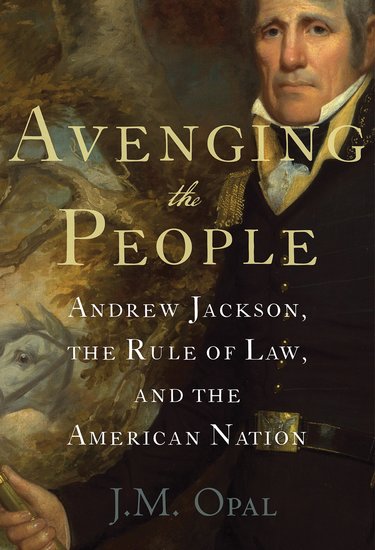
A New Look at Old Hickory
 In June 1820, several dozen legislators gathered in Murfreesboro, Tennessee, then the state capital, for an emergency session. Their goal was “Relief”: legislative action to protect Tennessee households from economic crisis. The previous year, as the Panic of 1819 first hit, these same representatives had passed a law to prevent creditors from suing debtors. Now they wanted to charter a “Bank of the People,” increasing the money supply and reducing the social power of the merchants and cotton gin owners who normally controlled credit. They did so in the name of the people’s sovereignty.
In June 1820, several dozen legislators gathered in Murfreesboro, Tennessee, then the state capital, for an emergency session. Their goal was “Relief”: legislative action to protect Tennessee households from economic crisis. The previous year, as the Panic of 1819 first hit, these same representatives had passed a law to prevent creditors from suing debtors. Now they wanted to charter a “Bank of the People,” increasing the money supply and reducing the social power of the merchants and cotton gin owners who normally controlled credit. They did so in the name of the people’s sovereignty.
But Andrew Jackson was (literally) in their way. Apparently in his Major General’s uniform, the Hero of New Orleans told those entering the state house that the proposed bank would violate the federal and state constitutions to which they had sworn fealty. Anyone who voted for it would thus be perjuring themselves, Jackson warned. That summer he also wrote an anti-Relief manifesto on behalf of “enterprising commercial adventurers” while quietly collaborating with Tennessee’s established bankers to sink the new experiment in economic democracy.
Eight years later, he won the White House by promising to restore the people’s sovereignty—to avenge them not only against foreign powers and domestic threats but also against corrupt politicians and moneyed interests.
Understanding how Jackson could take such positions without any sense of contradiction requires us to look closely at where he came from, in every sense of that loaded phrase. More to the point, we need to scrutinize his life and career before he became a legend at the Battle of New Orleans—and before he and his trusted allies began to shape and deploy that legend during the presidential campaigns of 1824 and 1828.
As of 1820, everyone knew that “the Hero” had a touchy sense of honor. Many people were aware of his youthful traumas. His economic and legal ideas were far more mysterious, except perhaps for the Tennessee lawmakers who favored stay laws and public banks. And yet Jackson had acquired a distinct sense of commercial “justice” and the rule of law during his ascent from borderlands orphan to territorial official. As a lawyer, judge, and confidante of Federalist elites, Jackson was a frontier version of Alexander Hamilton, one with fewer qualms about dueling and none about slavery.
Of course, the mid-Tennessee colony where Jackson came of political age was not just any frontier. During the early 1790s it was a uniquely terrifying place, besieged by Cherokee and Creek war parties and abandoned by the federal government. Both Jackson and his wife, Rachel, felt betrayed by the bloodless politicians in Philadelphia and swore revenge in the name of God’s ultimate sovereignty. They got some in 1794, when white militias waged off-the-record attacks against the “savage nations” to the south and east. But most of the credit went to state-level leaders who Jackson despised.
For most of his thirties (1797-1807), this violent man was controversial in mid-Tennessee and obscure everywhere else. He was no longer a Federalist but not really a Jeffersonian. In the wake of the Burr Conspiracy, the Sage of Monticello wrote a brief and stern letter to the Tennessee upstart, reminding Jackson that the day of the frontier avenger was over.
A new crisis with Britain and the ensuing wars of 1811-1818 changed everything. Against the hated empire and its native and black proxies, white Americans came to see their country as a kind of frontier household. They spoke of their “unexampled forbearance” against the monsters all around and lionized Andrew Jackson as the man who finally saved them from their nightmares.
This Jacksonian nation crystallized in early 1819, when Congress investigated the General’s invasion of Spanish and Seminole Florida. His supporters did not so much reject international law as appropriate it, insisting that the United States was the only innocent nation on Earth, the one country that could justly inflict rather than obey the law. Jackson was “the people’s great avenger,” the man “appointed by Heaven to tread the wine press of Almighty wrath.”
Later that year, the Panic hit, moving many thousands of people—especially in the southern and western regions were Jackson was most popular—to call for another kind of popular sovereignty against economic forces and international norms. They assumed that Jackson was on their side. This makes his rise to the White House and subsequent crusades against native peoples and national bankers all the more significant to larger narratives of capitalism and democracy in the United States.
Jason M. Opal is an associate professor of history at McGill University. He has authored Beyond the Farm: National Ambitions in Rural New England and edited Common Sense and Other Writings by Thomas Paine. His forthcoming book on Old Hickory is entitled Avenging the People: Andrew Jackson, the Rule of Law, and the American Nation.
